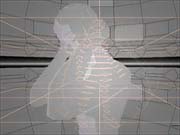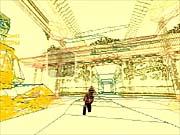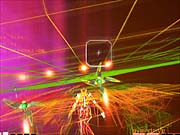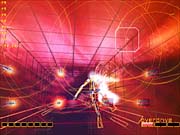Rez Preview
Find out about Sega's upcoming shooter from developer Tetsuya Mizuguchi.
Sega's upcoming shooter Rez will be one of the most visually unique games to come out in a great while. Developed by United Game Artists, the game has a dense, layered look that's made up of surreal imagery featuring a blend of old-school vector graphics and Jeff Minter-esque "melt-o-vision." The visuals are complemented by a trippy assortment of trance music that adds to the surreal feel of the game and fits with stylish approach found in UGA's Space Channel 5. Originally developed for the Dreamcast, Rez was announced for the PlayStation 2 earlier this year. The uniqueness of the game's look and sound is matched by the concepts that contributed to its development. Originally known as "K-project," the game's aesthetics were influenced by the concepts of Wassily Kandinsky (1866-1944), a Russian painter whose work was influenced by music. Fascinated with power of expression in music and the freedom of imagination it gave its listener, Kandisnky's work attempted to capture that abstraction in his paintings. UGA president Tetsuya Mizuguchi's familiarity with Kandisnky's concepts helped focus the ideas he had for a game into Rez. We talked to Mizuguchi about the game, UGA, and Space Channel 5 Part 2.

GameSpot: What was the inspiration for Rez?
Tetsuya Mizuguchi: Hmm. It's a difficult question. I'd have to say a rave I went to in Europe in 1995. It was a huge indoor party, and there were about five thousand people dancing. The sounds and light were all synchronized. I felt something. I imagined DJing--the sounds, lights, music, and everything. I thought it would be fun for a player.
GS: How did you decide on Rez's gameplay?
TM: I wanted to make a shooter first, because it's a physical and simple type of game. The first image I had was being in a tube with the music notes coming at you in 3D, so you shoot the sound coming at you. So I imagined it would be new and fun, which is the reason I decided to make it a shooting game.
GS: How did you decide on the graphic style?

TM: Old games, like maybe 20 years ago, were like this--vector scan and wireframes. But Rez isn't being nostalgic. The look is a conscious choice. Current games are a little too real now--there's no room for interpretation. But I think Rez is an experience, so I didn't want to put lifelike graphics in it. The combination of dark and light and faces and 3D textures is open to your interpretation as you play. The beginning of this game is simple, but it evolves and is very organic. The design concept was that it would evolve in gradients as you played through the game.
GS: How did you decide on the music?
TM: The first thing we did was decide on musicians. They had to understand what we were trying to do with the game--not only the music, but the visual design as well. That was important.
GS: Was it difficult to get them to understand your concept of the game?

TM: It was actually pretty easy to explain the concept to them. They understood what I was trying to do. We needed the sounds to be a bit "trancey" to get the player into the game.
GS: What is the story in the game about?
TM: The game is set in cyberspace. A virus has attacked it, and everything beautiful has been changed into something dark. Every sound and every visual has turned dark. If you shoot a virus, you'll get a beautiful effect and sound, which is you restoring the world and getting back the memories of human beings.
GS: Is there a message in the game?
TM: I had a deep message at first--it was kind of philosophical--but I didn't end up putting it in at the last minute because it was too heavy. [laughs] I tired to express it visually in the last stage. I think everyone can feel something from the game. It's more than just a struggle in cyberspace--it's also a journey that human beings take too. It's like a journey of life, a journey of becoming something.
GS: How would you categorize Rez?
TM: A music shooter.
GS: How did Wassily Kandinsky's work influence the game's development?
TM: Just his concepts. I personally understand his concept that every sound has color, dynamics, and shape. I imagined that, if he were alive in this era or his creative soul were alive here, what kind of game would he make? One hundred years ago, there were no digital media, no computers--painting was the only way he could express himself. I think his concepts were really great. They're not dated.
GS: How long was Rez in development?
TM: Three years.
GS: How long did it take to convert the game to the PS2 format?
TM: Eight months.
GS: Did you encounter any difficulties?
TM: Not especially.
GS: Is there a lot to unlock in the game?
TM: Quite a bit. You'll have to play every mode in the game to find everything.
GS: Is there a morolian form?
TM: [laughs] Maybe.
GS: Are you happy with how it turned out?

TM: Yes.
GS: Is the transvibrator coming to the US?
TM: I don't think so.
GS: What do you think of the game market right now?
TM: It's changing now. There are a lot more casual gamers coming in the Japanese and US market. I think it's getting better now.
GS: Do you ever feel pressure to make mainstream games?
TM: Yes. [laughs]
GS: Do you still feel the same freedom to develop what you want, given the changing market?
TM: Yeah, I still feel free. But it's risky now.
GS: Is it still fun to make games, though?
TM: Yeah.
GS: What other platforms interest you?
TM: Well, I'm interested in every type of hardware, but it's really difficult to develop a game on every console. Now UGA is focused on the PS2.
GS: How many games do you have in development?
TM: A few in preproduction. I've put a lot of resources into mobile stuff like cell phones.
GS: So Space Channel 5 Part 2 will be your last DC game?
TM: Yes.
GS: Any differences between the DC and PS2 versions?
TM: Not really. It will just be like Rez. The DC version will run at 30fps and the PS2 version will run at 60fps.
GS: What can you tell me about Space Channel 5 Part 2?
TM: It's crazier, happier--like a musical. The camera will move dramatically depending on how well you play. You can change Ulala's clothes and accessories by collecting items in the game.
GS: Do you think it will come to US?
TM: I don't know. It's difficult to do--there's a lot of voice-overs and singing this time. And there's Michael Jackson.
GS: You really got him?
TM: Yeah. He's the chief of Space Channel 5. He's Ulala's boss now.
GS: Will it be import friendly?
TM: Yeah, I think so. Even if you don't understand Japanese, I think you'll be able to enjoy it.
Thanks to Mizuguchi-san for his time. Rez will ship in January 2002 for the PlayStation 2.
Got a news tip or want to contact us directly? Email news@gamespot.com
Join the conversation